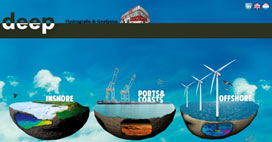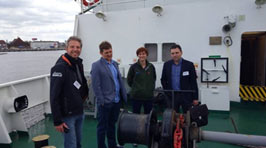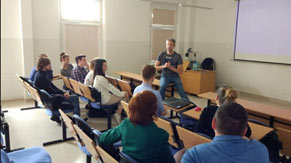In the period 25-26.05.2017, a meeting was held with Vincent Riekerk a representative of the hydrographic sector and a Dutch company Deep BV. The aim of the meeting was to tighten the cooperation, especially in the field of student work placements.

The meeting was attended by (MUS):
- representatives of the Faculty of Navigation - Vice Dean for Full-time Studies, Zbigniew Szozda, PhD. Eng.
- a representative of the Institute of Geoinformatics, Grzegorz Stępień, PhD. Eng.
- the academic teachers responsible for hydrographic subjects: Grzegorz Zaniewicz, MSc. and Izabela Bodus-Olkowska, Msc.
- Witold Kazimierski, PhD. Eng.
On 25.06.2017 , during the talks, many subjects were discussed important from the point of view of further cooperation e.g. the need for extending the work placement period from two weeks to a minimum of 2-3 months. Formalisation of the cooperation was proposed through signing of a letter of intent providing for work placements for 2-3 our students ever year. Based on previous experience, Mr Riekerk assessed the University students of the hydrographic module of the field of Geodesy and Cartography as hard working, ambitious, willing and eager to work, yet rather shy in contact and pointing to the language barrier as the main reason of their shyness. The apprenticeships and work placements in Deep BV are mainly aimed at practical activities and carrying out of specific field projects.
When requested for his opinion within the scope of the syllabus at MUS, Vincent Riekerk emphasised the added value of teaching the use of dedicated hydrographic and geoinformatic software on a wide scale. He also proposed introduction of programming classes, e.g. writing scripts in Python, describing this ability as one of the indispensable skills of contemporary times. The element indicated as the most important one is trainings provided for students directly on a ship and a measuring vessel, which would facilitate the initial selection of people who do not manage to work on water.
Moreover, another subject mentioned by the company representative was specialist certificates and licences welcome during recruitment for work placements or apprenticeships. It would be ideal if students were equipped in BOSIET (Basic Offshore Safety Induction and Emergency Training) certificates. Nevertheless, even basic STCW courses would make it easier for trainees to find a place on offshore vessels. Another important element would be conducting courses in accordance with IHO requirements in order to obtain a Hydrographer certificate of category A or B - possible to be obtained following a respective number of working hours in the profession.
When asked about a possibility of scientific cooperation, Mr Riekerk said that the company is definitely not focused on research an scientific development - therefore, it does not plan any work placements directly aiming at preparation of Engineer or Master theses. The participation of the company could only be limited to the role of a subcontractor.
On 26.05.2017, a meeting with students was held at Maritime University. Vincent Riekerk made a presentation of the company, outlined the scope and type of work the company does and described a typical day of a Deep BV employee. A surprise for the company representative was presentation of 3rd-year students of Geodesy and Cartography and fresh graduates of the hydographic module. The students prepared a short presentation on a selected subject related to hydrographic works. They included e.g. underwater vehicles, methods of underwater positioning, work with subbottom profiler and magnetometer data and well as development of bathymetric data. The presentations were prepared by: Karol Ginał, Eng., Dominika Panfil, Eng. and 3rd-year students of the hydrographic module of Geodesy and Cartography: Aleksander Pietrzak, Weronika Motyl and Agnieszka Wituszko.
CONCLUSIONS:
The meeting enabled drawing of the following conclusions:
- Deep is interested in regular obtaining of our students for paid apprenticeships in spring - they are satisfied with our MUS trainees;
- it is worth providing 2-3 students or graduates with a possibility of such apprenticeships - a solution must be worked out to make up for the educational shortcomings, which will arise during this period;
- it is necessary to work out a possibility of students of the hydrographic module to do their apprenticeship on NAWIGATOR XXI;
- it is worth providing the students of the hydrographic module (at last selected ones) with basic STCW and OSRM trainings as a part of their studies;
- the courses offered should be continuously adjusted to the needs of the market, e.g. through introduction of algorthmics and script programming;
- V. Riekerk declared the possibility of transferring the unused hydrographic equipment for the educational needs of MUS.




